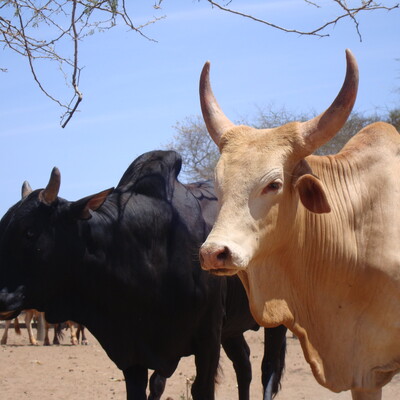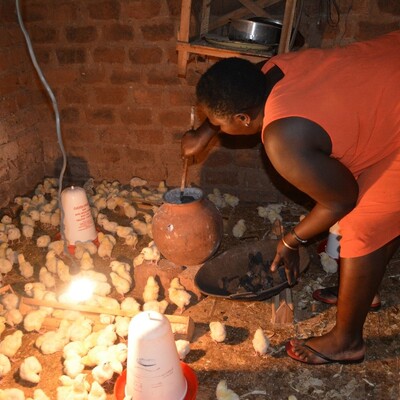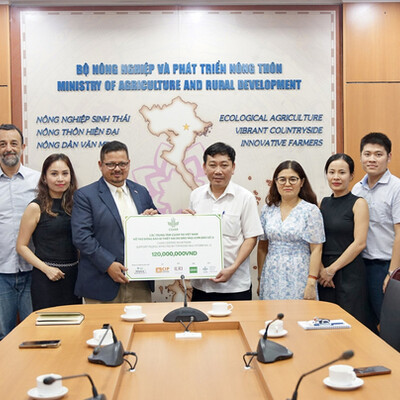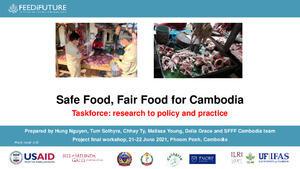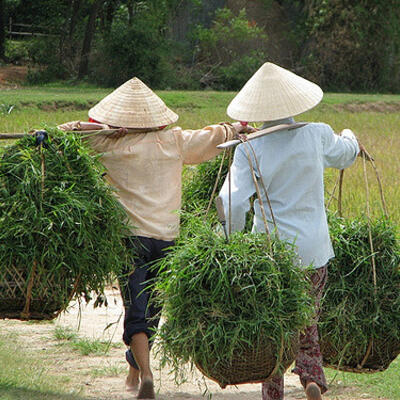

SAPLING Initiative empowers youth agripreneurs in livestock through digital innovation in Tanzania
Digital solutions are not just a trend, they are revolutionizing the agriculture sector and making jobs more lucrative for young people by increasing yields and profitability. The International Livestock Research Institute (ILRI) and Kuza Biashara Ltd are leveraging the digital revolution to empower agricultural entrepreneurs— ‘agripreneurs’—through the ‘Catalyzing Digital Extension through Agripreneurs’ initiative in the Tanga and Kilimanjaro regions of Tanzania. This initiative, which promotes proven dairy technology packages to smallholder farmers, fosters digital literacy and connectivity to enhance productivity and decision-making, and aligns with the broader Sustainable Animal Productivity for Livelihoods, Nutrition, and Gender Inclusion (SAPLING) program.
After its launch in March 2022, the initiative embarked on a 15-week incubation program featuring a total of 100 youth agripreneurs, with 49 females and 51 males, that were strategically organized into two cohorts of 50 agripreneurs. These young entrepreneurs went through an intensive Master of Business Administration-inspired executive education initiative that was designed and delivered through ‘Kuza Leadership Academy’ to fortify business and agronomy acumen. The first cohort incubation, which involved a group of 26 female and 24 male agripreneurs, commenced the incubation phase from October 2023 to February 2024. The second cohort, featuring 23 female and 27 male agripreneurs, started the incubation phase from May through August 2024.
Agripeneurs received a multi-faceted approach of entrepreneurship skills training, digitized and personalized advisory services for dairy smallholders, and active participation in a digitally enabled ‘One Network’ ecosystem. This is Kuza’s proprietary digital record-keeping tool that enables agripreneurs to register their farmers, customers, suppliers and buyers, track their business transactions, and generate reports and financial statements.
Young entrepreneurs not only acquired business skills but changed their perceptions. Upendo Ramadhan, a young agripreneur from Hai district Council in Kilimanjaro, gained confidence and is now focused on taking action to grow her business.
“I lacked self-belief in my business. I lost numerous opportunities due to my fixed mindset, the fear of starting up, and the negative reception of feedback. But now, I will improve by focusing more on actions and growth. I will add a suggestion box in my business so the customers can give me more feedback and compliments,” she noted.
The program's innovative approach has resulted in a remarkable 99.3% completion rate across all training sessions, and this underscores the eagerness of the agripreneurs to absorb and contribute to the transformative learning journey. Agripreneurs have demonstrated remarkable engagement in their entrepreneurial journey, with a focus on setting SMART goals, understanding market dynamics, and implementing effective marketing strategies. Moreover, 93% of the agripreneurs are actively using the One Network platform.
Daudi Kisakeni, an agripreneur from Muheza District, has seen significant growth in his customer base and business transactions since using the platform.
“I expanded my customer base from 70 to 90. The tool enables me to access all farmers' information and serve them better. I have updated farm services worth USD 994 (TZS 2.5 million) and engaged with 94 farmers. Kuza One Network has truly transformed my approach and commitment to achieving my goals,” he explains.
“In the past, I wasn't keeping records, which led me to not knowing the number of farmers I served, nor their preferences for livestock inputs, drugs, vaccines and other livestock services, or even other farmers’ details including phone numbers, number of animals they own or acreage size. I could not retain many farmers due to a lack of means of communicating with them. However, through the Kuza One network, I can keep records of my customers and suppliers in a very safe way. So far, I have registered 50 farmers to the One Network and am hoping to add more,” says Hosiana Temu, an agripreneur from Moshi district council in Kilimanjaro.
William William, a SAPLING incubation beneficiary from Hai district Council, plans to venture into livestock business opportunities once he graduates from the program. William is determined to leverage the available digital solutions to increase farmers’ access to livestock extension services by collaborating with other agripreneurs and widening the scope of their services to minimize the costs associated with service provision.
“Despite the tough business competition that most of us who offer livestock treatment services face in our community, I plan to keep working hard, offer more services in a bundle, and enter strategic partnerships that will eventually pave the way for win-win business competitions. In the future, I will also venture into an online business that will be able to connect all the service providers around Kilimanjaro and other nearby districts; hence, a farmer can be located easily and be served by a nearby service provider. This will minimize the transport costs and save time.” William explains.
The financial snapshot from the quarterly initiative’s implementation report paints a picture of a robust economic landscape. The agripreneurs in the One Network ecosystem recorded a substantial income totaling USD 48,946.32 (TZS 123.1 million) between September and December 2023, a clear testament to the initiative's success in boosting the financial standing of the participants.
Further, the agripreneurs collectively invested USD 26,202.78 (TZS 65.9 million) in purchases. Livestock inputs and farm services have been the primary areas of investment, accounting for USD 34,075.54 (TZS 85.7 million) and USD 14,671.96 (TZS 36.9 million), respectively. This diverse portfolio of services showcases the agripreneurs' adaptability and business acumen.
A comparison of the two cohorts shows that Cohort One agripreneurs are dedicated to inputs and to make a minor but meaningful contribution of TZS 425,000 million towards aggregation. On the other hand, Cohort Two exhibited a nuanced financial strategy, channeling TZS 11.2 million into mechanization and services while allocating a substantial TZS 60.4 million for inputs and a nominal TZS 6,500 for aggregation. These financial allocations underscore the deliberate choices made by each cohort to optimize their resources in alignment with their unique business objectives.
Through harnessing the power of technology, building strong networks, and fostering an entrepreneurial spirit, the SAPLING initiative is driving positive change in Tanzania's agricultural sector, ultimately contributing to livelihood improvements, nutrition advancements and gender inclusion.
See more on research activities in Tanzania here.
You may also like
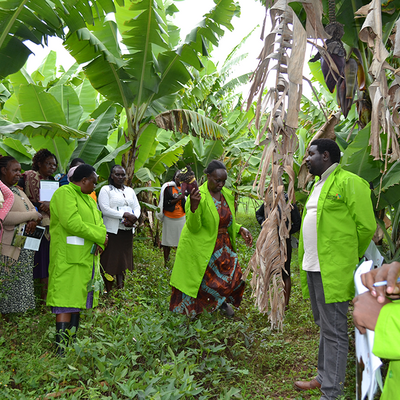
ILRI News
Pioneer adaptation farmers inspire adoption of climate-smart innovations in Bomet County, Kenya

ILRI News
Agricultural leaders explore the future of food security at DialogueNEXT conference in India
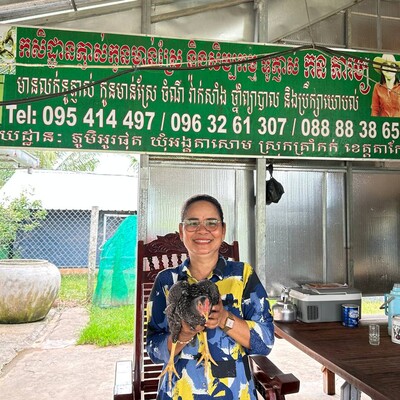
ILRI News
Improved indigenous chicken project boosting food security and livelihoods in Takeo Province, Cambodia
Related Publications
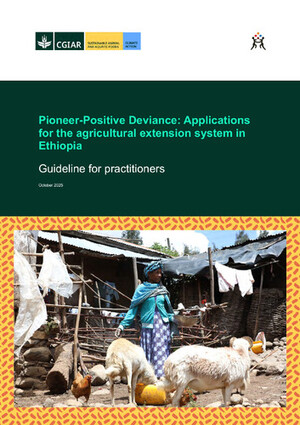
Pioneer-Positive Deviance—Applications for the agricultural extension system in Ethiopia: Guideline for practitioners
- Habermann, Birgit
- Worku, Tigist
- Teshome, A.
- Gebreyes, Million
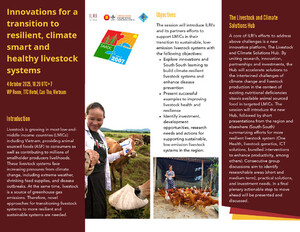
Innovations for a transition to resilient, climate smart and healthy livestock systems
- International Livestock Research Institute
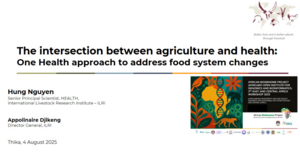
The intersection between agriculture and health: One Health approach to address food system changes
- Hung Nguyen-Viet
- Djikeng, Appolinaire

Assessing land use changes and agricultural practices in highland valley-bottom wetlands in Taita Hills, Kenya
- Gubamwoyo, S.
- Hein, T.
- Heiskanen, J.
- Kisha, D.G.
- Pellikka, P.
- Gruber, G.
- Omondi, V.A.
- Leitner, Sonja
- Weigelhofer, G.
- Mwamodenyi, J.M.
- Obonyo, A.O.
- Gettel, G.M.

Insights and future directions: Applying the One Health approach in international agricultural research for development to address food systems challenges
- Hung Nguyen-Viet
- Lam, Steven
- Alonso, Silvia
- Unger, Fred
- Moodley, Arshnee
- Bett, Bernard K.
- Fèvre, Eric M.
- Knight-Jones, Theodore J.D.
- Mor, Siobhan M.
- Ha Thi Thanh Nguyen
- Grace, Delia





